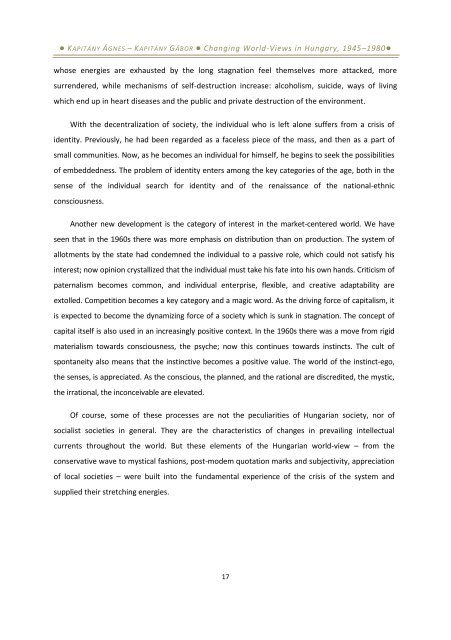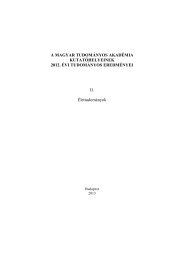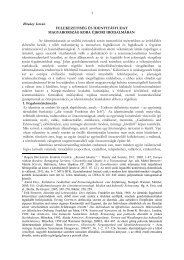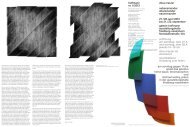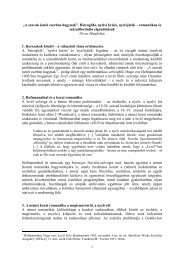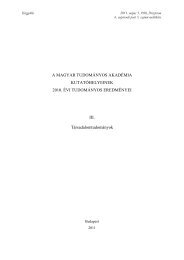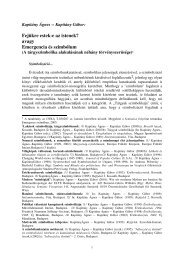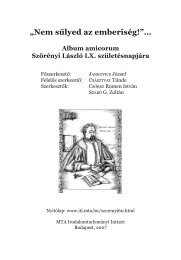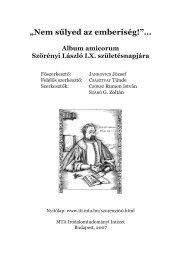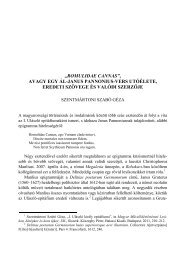symbolic elements of everyday culture - MTA Szociológiai ...
symbolic elements of everyday culture - MTA Szociológiai ...
symbolic elements of everyday culture - MTA Szociológiai ...
You also want an ePaper? Increase the reach of your titles
YUMPU automatically turns print PDFs into web optimized ePapers that Google loves.
● KAPITÁNY ÁGNES – KAPITÁNY GÁBOR ● Changing World-Views in Hungary, 1945–1980●<br />
whose energies are exhausted by the long stagnation feel themselves more attacked, more<br />
surrendered, while mechanisms <strong>of</strong> self-destruction increase: alcoholism, suicide, ways <strong>of</strong> living<br />
which end up in heart diseases and the public and private destruction <strong>of</strong> the environment.<br />
With the decentralization <strong>of</strong> society, the individual who is left alone suffers from a crisis <strong>of</strong><br />
identity. Previously, he had been regarded as a faceless piece <strong>of</strong> the mass, and then as a part <strong>of</strong><br />
small communities. Now, as he becomes an individual for himself, he begins to seek the possibilities<br />
<strong>of</strong> embeddedness. The problem <strong>of</strong> identity enters among the key categories <strong>of</strong> the age, both in the<br />
sense <strong>of</strong> the individual search for identity and <strong>of</strong> the renaissance <strong>of</strong> the national-ethnic<br />
consciousness.<br />
Another new development is the category <strong>of</strong> interest in the market-centered world. We have<br />
seen that in the 1960s there was more emphasis on distribution than on production. The system <strong>of</strong><br />
allotments by the state had condemned the individual to a passive role, which could not satisfy his<br />
interest; now opinion crystallized that the individual must take his fate into his own hands. Criticism <strong>of</strong><br />
paternalism becomes common, and individual enterprise, flexible, and creative adaptability are<br />
extolled. Competition becomes a key category and a magic word. As the driving force <strong>of</strong> capitalism, it<br />
is expected to become the dynamizing force <strong>of</strong> a society which is sunk in stagnation. The concept <strong>of</strong><br />
capital itself is also used in an increasingly positive context. In the 1960s there was a move from rigid<br />
materialism towards consciousness, the psyche; now this continues towards instincts. The cult <strong>of</strong><br />
spontaneity also means that the instinctive becomes a positive value. The world <strong>of</strong> the instinct-ego,<br />
the senses, is appreciated. As the conscious, the planned, and the rational are discredited, the mystic,<br />
the irrational, the inconceivable are elevated.<br />
Of course, some <strong>of</strong> these processes are not the peculiarities <strong>of</strong> Hungarian society, nor <strong>of</strong><br />
socialist societies in general. They are the characteristics <strong>of</strong> changes in prevailing intellectual<br />
currents throughout the world. But these <strong>elements</strong> <strong>of</strong> the Hungarian world-view – from the<br />
conservative wave to mystical fashions, post-modem quotation marks and subjectivity, appreciation<br />
<strong>of</strong> local societies – were built into the fundamental experience <strong>of</strong> the crisis <strong>of</strong> the system and<br />
supplied their stretching energies.<br />
17


